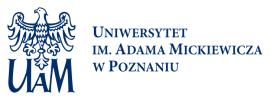
Basic information
- Study programme
- Lingwistyka stosowana (Applied Linguistics and Intercultural Communication)
- Speciality
- -
- Organizational unit
- Faculty of Modern Languages and Literatures
- Study level
- First-cycle programme
- Study form
- Full-time
- Education profile
- General academic
- Didactic cycle
- 2023/24
- Subject code
- 09LSAS.14HS.04081.23
- Lecture languages
- English
- Course type
- Obligatory
- Block
- Humanities and social subjects
|
Period
Semester 3
|
Activities and hours
|
Number of ECTS points
2
|
Goals
| Code | Goal |
| C1 | Transfer of knowledge of the definitions of the phenomena of culture and communication. |
| C2 | Transfer of knowledge from the area of potential barriers in verbal and non-verbal communication in international contexts. |
| C3 | Transfer of knowledge of various measurements of national culture based on Hofstede and the criticisms related. |
| C4 | Sensitizing to, among others, culturally conditioned potential differences and misunderstandings in communication and developing the basic skill of effective and adequate communication in intercultural environments. |
Subject learning outcomes
| Code | Outcomes in terms of | Learning outcomes | Examination methods |
| Knowledge – Student: | |||
| W1 | Will know selected definitions of culture and communication. | LSA_K1_W02, LSA_K1_W08 | Written colloquium |
| W2 | Will know the dimensions of national cultures. | LSA_K1_W02 | Written colloquium |
| Skills – Student: | |||
| U1 | Will be able to indicate sources of potential verbal and nonverbal communication barriers in intercultural context. | LSA_K1_U03, LSA_K1_U04, LSA_K1_U05, LSA_K1_U07 | Written colloquium |
| U2 | Will be able to refer to the dimensions of national cultures critically. | LSA_K1_U03, LSA_K1_U04, LSA_K1_U05, LSA_K1_U07 | Oral statement |
| Social competences – Student: | |||
| K1 | Will be able to show sensitivity to cultural differences and openness to communication and common action with people from various cultural environments. | LSA_K1_K01 | Oral statement |
Study content
| No. | Course content | Subject learning outcomes | Activities |
| 1. |
Culture and communication – definitions of the key terms of intercultural communication. |
W1, K1 | Conversatory classes |
| 2. |
Sources of potential barriers in verbal and nonverbal communication in intercultural context . |
U1, U2, K1 | Conversatory classes |
| 3. |
Dimensions of national cultures based on Hofstede – critical interpretation. |
W2, U2, K1 | Conversatory classes |
Additional information
| Activities | Teaching and learning methods and activities |
|---|---|
| Conversatory classes | Lecture with a multimedia presentation of selected issues, Conversation lecture, Discussion, Work with text, Case study, Problem-based learning, Game/simulation, Workshop method, Project method, Demonstration and observation, Audio and/or video demonstrations, Activating method - constructing "mind maps", Work in groups |
| Activities | Credit conditions |
|---|---|
| Conversatory classes |
a) Attendance: attendance in classes is compulsory. If a student misses a lesson and does not justify their absence of min 1/3 of classes, the student shall not get a positive grade due to unsatisfactory attendance rate b) Particular homework assignments: doing homework (reading a text, preparing the assigned tasks, etc.) in due time is compulsory. Failing to prepare more than 1 homework per semester means no possibility of passing the subject c) Knowledge test: written multipole choice test graded according to the following criteria: Very good (bdb; 5,0): 98-100% correct answers Good plus (+db; 4,5): 95-98% correct answers Good (db; 4,0): 85-94% correct answers Satisfactory plus (+dst; 3,5): 76-84% correct answers satisfactory (dst; 3,0): 60-75% correct answers unsatisfactory (ndst; 2,0): below 60% correct answers d) Preparation for and participation in the Oxford debate. Participation is graded according to the following criteria: bdb very good preparation for the debate, excellent usage of the knowledge gained of a given area of intercultural communication db+ good preparation for the debate, very good usage of the knowledge gained of a given area of intercultural communication db good preparation for the debate, good usage of the knowledge gained of a given area of intercultural communication dst+ satisfactory preparation for the debate, good usage of the knowledge gained of a given area of intercultural communication dst satisfactory preparation for the debate, satisfactory usage of the knowledge gained of a given area of intercultural communication ndst lack of preparation or inadequate preparation for the debate, lack of basic usage of the knowledge gained of a given area of intercultural communication |
Literature
Obligatory- Jandt, F. E. (2018). An Introduction to Intercultural Communication. Identities in a Global Community. SAGE Publications, London, 9th Edition.
- Other pieces of reading are going to be provided in the classes.
Calculation of ECTS points
| Activities | Activity hours* | |
| Conversatory classes | 30 | |
| Preparation for classes | 10 | |
| Reading the indicated literature | 5 | |
| Preparation of a multimedia presentation | 5 | |
| Preparation for the assessment | 10 | |
| Student workload |
Hours
60
|
|
| Number of ECTS points |
ECTS
2
|
|
* academic hour = 45 minutes